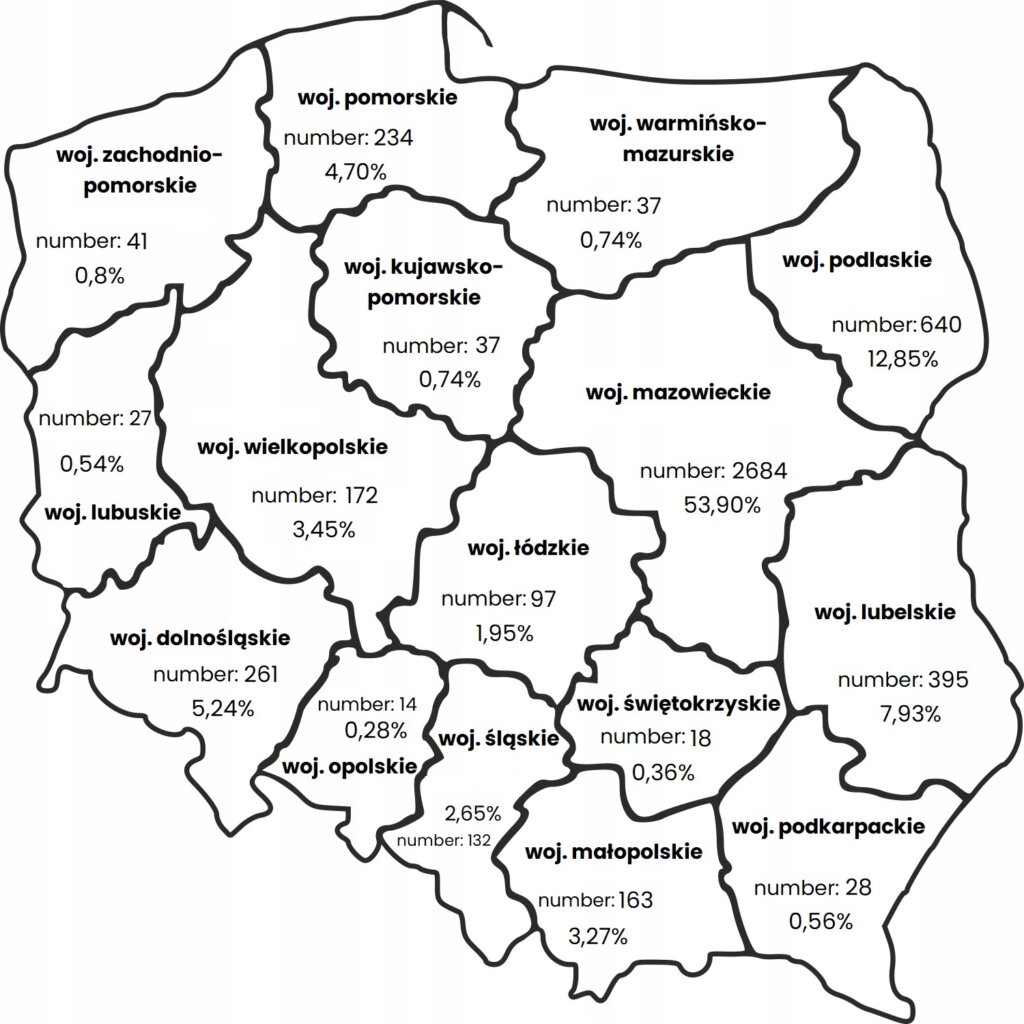There are 4980 businesses with Belarusian capital registered in Poland as of the end of 2022, 1733 of them were registered during the last year. And there were just 303 Polish companies in Belarus in 2021 in total), at the same time, 28 and 30 thousands of Belarusians have Polish temporary and permanent residency permits respectively[1]. By keeping its doors open for Belarusians, Poland is saving them from a human rights crisis, but also gaining strong economic stimulus.
Poland-Belarus economic relations
Even though post-soviet Belarus and Poland had never had positive political relations, economy-wise both countries had quite strong economic relations in trade, investments, and labor migration[2][3].
Trade relations have intensified during the last 5 years making up the record 2.23 bn. USD of imports from Belarus in 2021 (+76% from 2017), and record 2.09 bn. USD exports to Belarus in 2021 (+41% from 2017).
Poland traditionally exported Machinery, equipment, and mechanisms; Plant products; Plastics products; and Metals and metallic products to Belarus. Poland imported Wood and wooden products; Vehicles; Metals and metallic products; and different industrial products from Belarus.
Even though there are much fewer companies with Polish capital in Belarus than Belarusian companies in Poland, they are much larger. Most Polish enterprises are export-oriented woodworking, plastic and furniture producers, and “Stadler”.

Total FDI net inflow from Belarus to Poland was persistently low (and even negative) and has shown huge growth after the last presidential elections in Belarus, making up 15,9 mln. USD in 2021 (+2438%[4] from an average of -0,7 mln. USD over the last 10 years). At the same time, the net FDI inflow from Poland to Belarus was 23,6 mln. USD in 2021 (-5% from an average of 24,9 mln. USD over the last 10 years) – incomparably low taking economy size into consideration. In 2021 Poland was a top-6 investor in Belarus (by total FDI), Belarus didn’t make it to the top, but the current net FDI inflow from Belarus is close to one of the much larger economies – Russia and Turkey.
Polish organizations didn’t invest much into statutory funds in Belarus: just 2,2 mln. USD in 2021, which implies that Polish FDI in Belarus were represented in other forms like earnings reinvestments. Surprisingly, Polish FDI net inflow to Belarus in the first half of 2022 has shown 2.1 times growth, most probably, due to the restrictive measures implemented by Belarusian authorities and European sanctions.
Clear reasons for relocation
Belarus had never been a dream country to run a business: Belarusian GDP in USD is 10 times smaller than the Polish one, and the economy is unstable. Despite surprisingly high positions in Doing Business rating[5], Belarus demonstrated awful results in the other indexes (Index of economic freedom[6], Worldwide governance indicators[7]). Often, when a private company with Belarusian roots grew bigger – it changed its headquarters and main jurisdiction (e.g. Epam, Flo Health, Wargaming) for western countries, leaving significant numbers of personnel back in Belarus.
The situation changed dramatically in the short period of 2020 – 2022. After the wrecked presidential elections in Belarus, unprecedented repressions, and following sanctions it became much harder to run a business in Belarus as well as to have economic relations with the EU countries. Ryanair hijacking[8] didn’t make things easier. Russian invasion worsened the economic situation and led to 9 packages of European sanctions (partially on Belarus), and to many other sanctions from Western countries. Some of the businesses had to fully stop their operations (logistics, external trade), and others raised their interest in relocation.
Geography of relocation processes
Founders and CEOs play a huge role in SMEs, as the relocation from Belarus concerns foremost privately owned SMEs – the founders are the ones who decide where the company will move.
When they make this decision, a long list of personal and business factors is taken into consideration[9]:
- Belarusian community/diaspora
- Geographical closeness to Belarus, EU membership
- Language and cultural differences
- Cost of living
- Migration regulations for individuals and business owners
- Corporate taxes, ease of doing business
- Market size and growth perspectives
- Institutional support to the businesses from the state, development institutions, and NGOs
Based on those and other factors, Belarusian businessmen tend to choose following countries[10]:

The scale of the relocation to Poland and the portrait of typical Belarusian company
Official Belarusian statistics shows that the number of SMEs and individual entrepreneurs in the country had decreased by 2% (5,8 thousand) during the first half of 2022[11]. But those numbers don’t fully reflect the situation as the legal entity liquidation processes sometimes take a while. In many cases, those companies are not just closing up but relocating.

As of the end of 2022, businesses with Belarusian capital have demonstrated huge growth in registrations in Poland[12]. Less than 60 companies were registered each year until 2012. At the same time, an average of 474 companies was registered each year over the last 10 years (2013-2022). With a record of 1733 in 2022.

We must state that the real numbers are even higher because many Belarusians with Polish roots have acquired Polish passports and aren’t represented in the abovementioned statistics (Belarusians have received approximately 92 thousands+ of “Pole’s cards” from 2016 till the end of 2022).
By voivodeship, Belarusian businesses are concentrated in Masovia (53,9%), and at the eastern border: Podlaskie Voivodeship (12,85%), and Lubusz Voivodeship (7,93%).

Same as with Voevodships, Top-10 cities by the number of companies with Belarusian capital is led by Warsaw (as an economic center), followed by cities close to the Belarusian border, and other large Polish cities.

Following economic sectors are widely represented among Belarusian businesses in Poland: wholesale and retail trade; transportation and storage; construction; information and communication, together those 4 sectors make up 73% of all registered Belarusian companies.

98% of all Belarusian companies are registered as LLCs, with only 2% choosing other legal forms.
The number of Individual Enterpreuers-Belarusians working in Poland is not published by statistical agencies, but according to estimates, it equals approximately 2 thousands[13], with roughly half of them representing small businesses and the second half – simply being employed this way. Belarusian individual entrepreneurs represent mostly services, such as B2B and beauty.
An impact on the Polish economy
Relocation from Belarus is an ongoing process and its impact is difficult to measure, especially considering that it had just got the strongest stimulus – war. Another problem is that the data on employment, revenues, investments, and taxes paid by Belarusian businesses in Poland is not published.
Some data such as employment rates might be analyzed using open sources. The IT sector seems to be an absolute leader in all of the above-mentioned indicators. Below is the information on the numbers of employees among IT companies with Belarusian roots[14] in Poland according to recent LinkedIn data[15]:

Linkedin data is not precise, as it is put in by the users themselves, and because some Belarusians put wrong location there (for companies’ PR porpuses), but it can give an overall picture. Altogether, TOP20 companies with Belarusian roots in Poland (out of 45 studied) employ approximately 12458 people which makes up approximately ⅓ of their total global personnel.
In November 2022, more than 105,9 thousand Belarusians in Poland paid contributions to the local social insurance fund (ZUS), becoming the second largest group of officially employed foreigners in the country (after Ukrainians)[16].
Even though the Belarusian private sector’s size is insignificant compared to the Polish one, it is yet possible for Poland to benefit significantly from either IT outsourcing firms, so-called “hidden champions[17]”, or potential unicorns:
- There are at least 435 ICT firms (296 Computer programming activities) with Belarusian roots registered in Poland, and as mentioned before they have created tens of thousands of workplaces in Poland and already play an important role in Polish IT services export.
- It seems that for now many of the Hidden champions have preferred the Baltic states instead of Poland (e.g., enterprises from AIMA – Belarusian association that unites manufacturers of innovative high-tech products). But the relocation from Belarus has only accelerated, giving Poland the chance to change the situation.
- Unicorns: Belarusians are known for their exceptional IT skills and world-known startups (Flo, MSQRD, PandaDoc, Loóna, OneSoil), and recent studies show that around 40% of the Belarusian startups have relocated with many choosing Poland as their base country[18]. The relocation of startups led to the relocation of startup communities and the creation of new ones. As of the end of 2022, there are already 3 startup communities with Belarusian roots in Warsaw.
In light of the foregoing, we must conclude that Belarusian businesses and Belarusians as a labour force have already become an important part of the Polish economy and innovative ecosystem, but their exact impact is yet to be studied.
What will happen in upcoming years
Uncertainty rules the world since the US-China trade war, and it only became stronger after the Covid-19 and Russian invasion. It is hard to say what awaits Eastern Europe as the most unstable region at the moment. One thing is clear – part of the Belarusian private sector is no longer willing to develop in its own country, despite extremely low taxes, moderate bureaucracy, and inexpensive qualified labor. All those factors are outweighed by the factors of personal security, political stability, rule of law, and last, but not least – ethics and morality.
Whether those companies will return back to Belarus when the political situation there stabilizes – remains unclear, and will depend foremost on the time taken on this process, with each passed year minimizing the chances for their return.
Companies with Belarusian capital registered in Poland make up approximately 0,5% of all registered SMEs in Belarus (excluding entrepreneurs). On the one hand, that is not much, on another – that creates a huge potential for the upcoming years.
Whether Poland will remain the first choice as a country for relocation will depend foremost on migration regulations for Belarusian businessmen (which remain too tight), as well as on access to finances on the Polish market and on the geopolitical stability in Poland and Eastern Europe.
Dzmitry Danilchuk is a Belarusian economist, management consultant, and ex-lecturer of Global economics at Belarusian State University. Currently, Dzmitry is working as head of ZPP’s Belarus Business Center – a project that helps Belarusian businesses in Poland.
Footnotes:
[1] Цэнтр Беларускай Салідарнасці / Centrum Białoruskiej Solidarności
[2] Official Belarusian Statistics
[4] low base effect.
[5] https://archive.doingbusiness.org/en/doingbusiness
[6] https://www.heritage.org/index/
[7] https://info.worldbank.org/governance/wgi
[8] https://www.nytimes.com/2021/05/23/world/europe/ryanair-belarus.html
[9] Belarus Business Center’s data based on the results of round tables with Belarusian businesses
[10] Belarus Business Center’s estimations
[13] Belarus Business Center’s estimations
[14] List of IT companies (product and outsourcing) with Belarusian roots in Poland by Dzik Pic telegram channel
[15] LinkedIn data on 11/01/2023
[17] Hidden champions are relatively small but highly successful companies that are concealed behind a curtain of inconspicuousness, invisibility, and sometimes secrecy – Wikipedia


